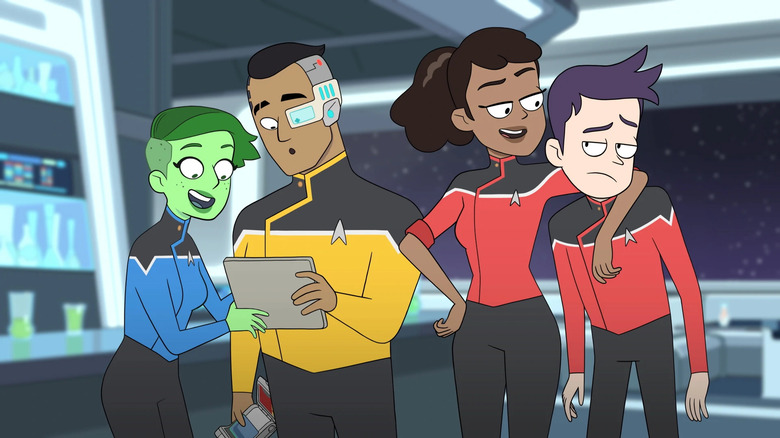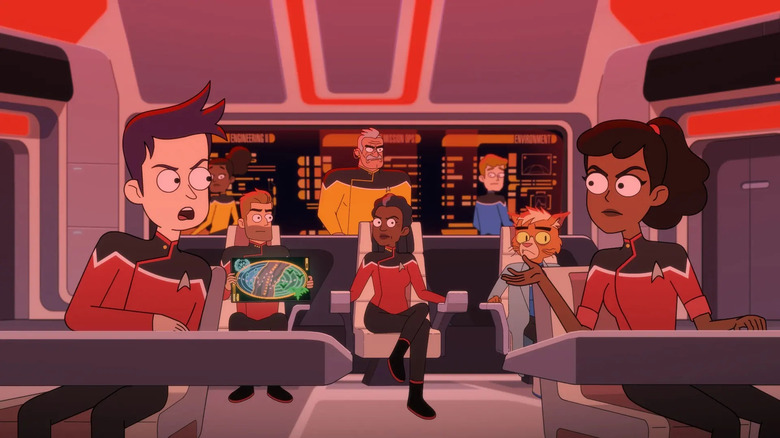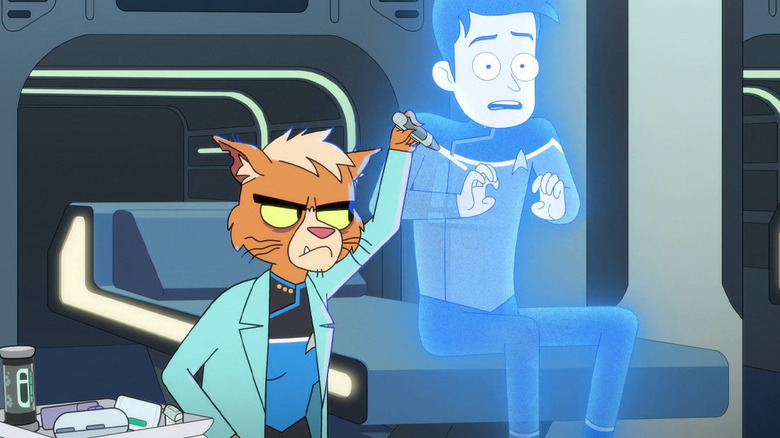Will The Star Trek: Lower Decks Crew Command Their Own Ship One Day?
A recent article on /Film argued that the characters on "Star Trek: Lower Decks" are seeing an accelerated growth arc, perhaps by mere dint of the show's 30-minute format. "Lower Decks" is downright jaunty, forcing a great deal of madcap incident into its brief runtime and comparatively reduced season lengths (each of the show's seasons run only 10 episodes, compared to 1990s "Trek" shows that ran 26). It also helps that there are only four main characters on "Lower Decks," whereas most other Trek shows hover around seven or eight. When it came to the franchise's average format, showrunners could take their time in developing characters, using entire hours to develop one small facet of only one person.
It's also notable that most of the characters that typically appear on "Trek" shows are already mature and achieved and professional when audiences meet them. Their primary concern is doing their job well, and petty anxieties have, it is presumed, already been dealt with. As such, growth arcs tend to skew long for "Trek" characters; it may take years for someone to confront a lingering prejudice or persistent phobia. In contrast, the quartet of "Lower Decks" ensigns are all young and still eager to prove themselves to their superior officers. They have a lot of character challenges yet to overcome. Their accelerated chronology allows them to grow quickly and reach catharses at a much more rapid pace.
In a 2020 interview with ComicBook.com, "Lower Decks" creator Mike McMahan — a veteran of "Rick and Morty" — addressed how the characters in "Lower Decks" were akin to Morty, and how their leeway to grow up quickly may lead to the central characters eventually making their way out of their professional ruts and commanding a starship of their own.
A ship of Mortys
McMahan gave his interview immediately after the August 6, 2020 premiere of "Lower Decks," and had to rely on the more familiar "Rick and Morty" as an analogy to describe what the new show was going to be about. McMahan understood from the start that the characters would start as amateurs, but accrue experience quickly. It also helped that Starfleet officers, even the low ranking ones, had to be eager to learn and devoted to their work. Growth, McMahan said, was going to be inevitable:
"[T]hat's the exciting thing from a linear perspective: When you're starting with these characters, they're at the bottom of the ship. And even when we're writing, it's the same thing that happened with Morty. He started off knowing nothing and being an idiot. That's not what our characters are. They start off with knowing a little bit more than Morty, but now in Rick and Morty he is more aware of these sci-fi adventures he's going on ... So it ends up becoming more complex, and the characters have to grow."
Indeed, if a character's defining feature is their youth and inexperience, then it's not much of a character. Eventually, they'll be older and experienced because of the way linear time works. "Trek" sometimes presents naïve characters well, having them transform into more resolute, complicated figures (e.g. Dr. Bashir on "Deep Space Nine"). Sometimes, a character will always be defined by their comparative youth to their co-stars (e.g. Wesley Crusher on "Next Generation"), and sometimes the writers leave ensigns high and dry, never promoting them and leaving them frustratingly unable to grow (e.g. Harry Kim on "Voyager").
Riker wasn't always Riker
McMahan, as all logical Trekkies have, idly wondered as to the backstories of some of the "Star Trek" franchise's more notoriously mature characters. Occasionally, audiences will be treated to a flashback moment wherein a staid figure displays a moment of youthful indiscretion, i.e. when Kirk cheated at the Kobayashi Maru test at Starfleet Academy, or when Picard was stabbed in the back by a seven-foot Nausicaan during a bar brawl, leading to him requiring an artificial heart. "Lower Decks," incidentally named after an episode of NextGen about a quartet of random ensigns, is essentially gathering all the youthful indiscretions in one place and slowly witnessing the youths transform into Picards. In McMahan's words:
"The thing I would love the most is if we had enough seasons of this show and enough stories that you could see, where does a bridge crew come from? How do we expand on the original TNG episode of 'Lower Decks?' What if that just kept going? And what if we saw, Riker wasn't always Riker, Picard wasn't always Picard. You get a lot of those flashback episodes, but not everybody can become who they are because you get stabbed in the heart by a Nausicaan. You become who you are because of a million little things that happen on a million little days, and they all build up."
Will the lower-deckers become captains someday? Perhaps. Although one of the central gags of the show is that the main characters have pretty crappy jobs on a rinky-dink California class ship that Starfleet doesn't much care about. They may not all become the next Captain Picard, but they each have a fair shot at being the next Harry Kim.


